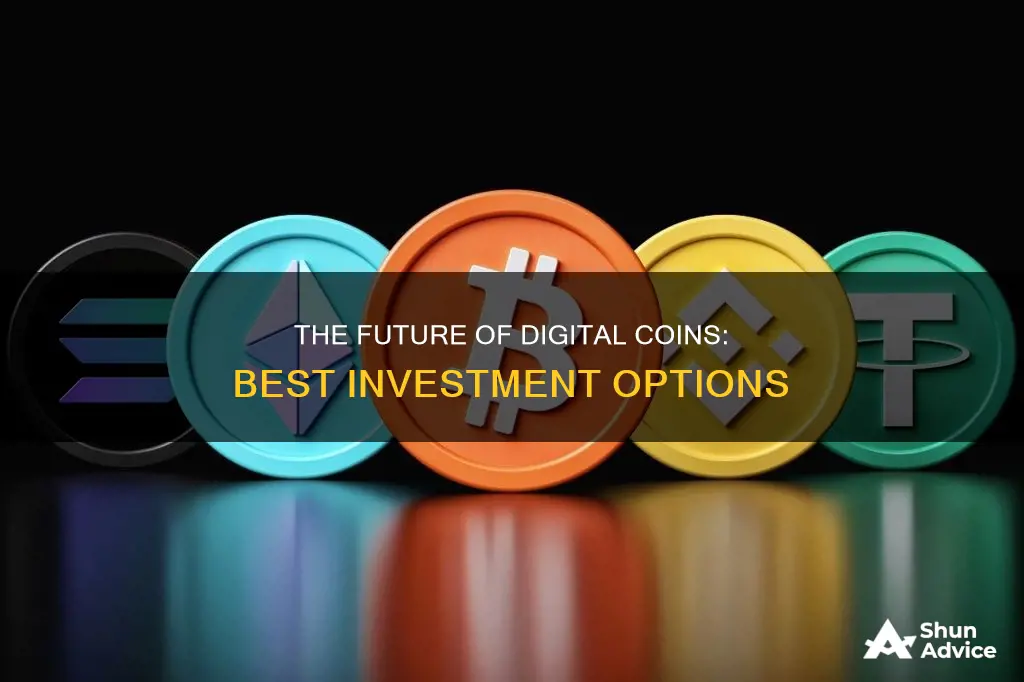
With thousands of cryptocurrencies in existence, choosing the best digital coin to invest in can be challenging. Bitcoin and Ethereum are the most well-known and dominant players in the crypto market, but there are other options to consider.
When deciding which cryptocurrency to invest in, it is important to conduct thorough research and consider your financial goals and risk tolerance. Here are some of the top cryptocurrencies to consider:
- Bitcoin (BTC): The original cryptocurrency, launched in 2009, with a market cap of over $1 trillion. It is considered a good investment due to its long history of steady growth and is often treated as a hedge against inflation.
- Ethereum (ETH): The second-largest cryptocurrency, launched in 2015, with a market cap of over $300 billion. It is a favourite among developers due to its smart contract functionality and is integral for those exploring decentralised applications.
- Binance Coin (BNB): The native token of Binance, one of the largest crypto exchanges in the world. It offers lower fees for trading on the Binance platform and has expanded to include trading, payment processing, and travel arrangement applications.
- Solana (SOL): A high-speed blockchain protocol that can process thousands of transactions per second. It is known for its low transaction fees and is ideal for applications that require fast processing, such as video streaming or gaming.
- Tether (USDT): A stablecoin pegged to the US dollar, helping to stabilise the volatile crypto market. It is often used by investors to protect their investments during market fluctuations.
- Cardano (ADA): A decentralised blockchain project that uses a proof-of-stake consensus algorithm, making it more energy-efficient than other protocols. It facilitates smart contracts and aims to be highly scalable for decentralised applications.
- Dogecoin (DOGE): A cryptocurrency that began as a joke based on the Doge meme but has since gained a passionate community of supporters, including high-profile figures like Elon Musk.
- Avalanche (AVAX): A decentralised platform that supports thousands of transactions per second and incentivises active participation within its network.
- Ripple (XRP): A payments network and native token of the XRP Ledger, used by banks and financial institutions for quick and cheap transactions.
- Polkadot (DOT): A next-generation blockchain protocol that enables the connection and security of multiple blockchains, allowing for the transfer of various digital assets.
- Shiba Inu (SHIB): A meme coin created as a joke in 2021, based on the Dogecoin meme. It has gained significant traction on social media and has the potential for high volatility and rapid price fluctuations.
These are just a few examples of the many cryptocurrencies available for investment. It is important to remember that the crypto market is highly volatile, and there are risks associated with investing in digital coins. Conducting thorough research and understanding your financial goals is essential before making any investment decisions.
What You'll Learn

Bitcoin's value and popularity
Bitcoin's price has skyrocketed as it has become a household name. In May 2016, one bitcoin was worth about $500. As of August 2024, a single bitcoin's price was around $55,175, representing a growth of 10,935%. Bitcoin's value is also influenced by its easy divisibility, with its smallest unit, 0.00000001 bitcoin, called a "satoshi".
One of the key factors contributing to Bitcoin's popularity is its decentralized nature. It is a peer-to-peer online currency that allows transactions to happen directly between equal and independent network participants without the need for intermediaries such as banks or other financial institutions. This lack of central control and the fact that it cannot be inflated or manipulated by any individual, company, or government, makes Bitcoin attractive to those seeking an alternative to traditional fiat currencies.
Another factor contributing to Bitcoin's popularity is its security. Bitcoin's blockchain technology, a distributed ledger verified across a network of computers, ensures that transactions are secure and tamper-proof. Additionally, Bitcoin's proof-of-work consensus mechanism, which involves solving computationally difficult puzzles to add new blocks to the blockchain, further enhances its security.
However, Bitcoin has also faced challenges and criticism. Newer digital currencies have emerged that offer faster and cheaper transactions. Competitors also boast additional features like smart contracts and decentralized finance (DeFi), which Bitcoin lacks natively. There are also concerns about Bitcoin's energy consumption, as its proof-of-work consensus mechanism requires significant computational power.
Despite these challenges, Bitcoin continues to be the most valuable and popular cryptocurrency, with a market capitalization of over $1 trillion as of August 2024. Its first-mover advantage, brand recognition, and dedicated community of users and enthusiasts have contributed to its enduring popularity.
Is Buying a Whole Bitcoin a Smart Investment Move?
You may want to see also

Ethereum's functionality and market position
Ethereum is a decentralized blockchain platform that allows developers to build and deploy applications and smart contracts. It is often compared to Bitcoin, but while the two cryptocurrencies have many similarities, there are some important distinctions.
Ethereum is described by its founders as "the world's programmable blockchain," positioning itself as a distributed virtual computer on which applications can be developed. The Bitcoin blockchain, by contrast, was created only to support the bitcoin cryptocurrency as a payment method.
Ethereum's native cryptocurrency, Ether (ETH), is the second-largest cryptocurrency by market capitalization, behind only Bitcoin. It is used to pay for transactions and as collateral by network validators.
One of Ethereum's key functionalities is its ability to create and deploy permanent and immutable decentralized applications, with which users can interact. Decentralized Finance (DeFi) applications provide financial instruments that do not directly rely on financial intermediaries like brokerages, exchanges, or banks. This facilitates borrowing against cryptocurrency holdings or lending them out for interest.
Ethereum also allows users to create and exchange non-fungible tokens (NFTs), which can be tied to unique digital assets such as images, sports memorabilia, and virtual real estate.
In terms of market position, Ethereum is the second-largest cryptocurrency by market capitalization, behind only Bitcoin. As of August 2024, Ethereum had a market capitalization of $295.5 billion, with a price of around $2,458 per ETH, representing a growth of 22,242% since April 2016.
Ethereum's transition to a proof-of-stake consensus mechanism in September 2022 has also enhanced its market position. This upgrade, known as "The Merge," eliminated the need for energy-intensive mining, cutting Ethereum's energy usage by 99%.
Ethereum's growth can be attributed in part to its smart contract capability, which has enabled a growing ecosystem of decentralized applications (DApps), non-fungible tokens (NFTs), and more.
Overall, Ethereum's functionality and market position make it a significant player in the cryptocurrency space, with a strong foundation for future growth and development.
Strategies for Choosing the Right Crypto Coin
You may want to see also

Binance Coin's utility and drawbacks
Binance Coin (BNB) is a form of cryptocurrency with a wide range of applications. It is the native cryptocurrency of the Binance exchange, one of the largest and most reputable cryptocurrency exchanges globally. BNB can be used to pay for trading fees, withdrawal fees, and other fees associated with using the platform. Binance offers discounted fees for users who pay with BNB, making it a cost-effective option for frequent traders.
One of the primary benefits of Binance Coin is that it allows for quick and easy transactions, not only on the Binance exchange but also beyond it. Binance has partnered with numerous businesses and merchants that accept BNB as a form of payment, including credit crypto card bills, online purchases, travel, and entertainment. BNB can also be used for payment processing or even booking travel arrangements. Additionally, Binance has developed its blockchain ecosystem, the Binance Smart Chain, which allows for the creation of decentralised applications and smart contracts using BNB.
Binance Coin has a limited supply, with a maximum of 200 million coins set to be created. This means that as demand for BNB increases, its value is likely to appreciate, providing users with an opportunity to earn significant returns on their investment. BNB also has a unique burndown policy, where Binance uses 20% of their profits to buy back and destroy BNB tokens until only 100 million are left in circulation. This process aims to maintain the value of BNB and promote gradual growth.
However, as with any investment, Binance Coin has some drawbacks and risks. The crypto market is highly volatile, and the value of Binance Coin can fluctuate rapidly, making it a high-risk investment. While Binance Coin is widely accepted, its acceptance outside of the Binance ecosystem is limited, and users may face difficulty finding merchants who accept it as a form of payment.
Another potential downside is the centralisation of Binance Coin. Binance has immense control over the coin, and there are concerns about the possibility of manipulation. Binance has also faced regulatory issues in several countries, including the UK, Thailand, Japan, Canada, Germany, and Malta. Additionally, Binance has been a target for cyber-attacks, and some investors may be concerned about security risks.
Overall, Binance Coin has the potential to be a profitable investment, but it is important to carefully consider the risks and drawbacks before investing.
Gordon Ramsay's Bitcoin Adventure: Has He Invested?
You may want to see also

Solana's speed and reliability
Solana is a high-performance, decentralised blockchain platform that can support a wide range of applications, including decentralised finance (DeFi), gaming, and more. It was founded in 2017 by Anatoly Yakovenko and has since become one of the fastest and most functional web-scale projects that leverage the features of programmable blockchain technology to deliver Decentralized Finance (DeFi) solutions.
Solana's blockchain is designed to be fast and efficient. It can process transactions at lightning speed, thanks to its unique consensus algorithm known as Proof of History (PoH). PoH creates a historical record of events on the blockchain, serving as a verifiable timestamp for each transaction. This enables the network to process transactions in parallel, greatly increasing its overall throughput. As a result, Solana can handle over 65,000 transactions per second (tps), making it one of the fastest blockchains in existence.
The network's speed is further enhanced by optimisation techniques such as TurboVote, which allows validators to vote on the state of the network more quickly, reducing confirmation times. Additionally, the Gulf Stream protocol enables validators to receive transaction data ahead of time, reducing the time it takes to propagate transactions across the network.
Solana's block times are 400 milliseconds, and as hardware gets faster, so will the network. The network is also highly decentralised, with over 3,000 full nodes distributed across more than 100 countries, making it the second most decentralised network after Ethereum. This widespread distribution of nodes contributes to the network's resilience and security.
The Solana Foundation regularly releases updates and metrics on the network's performance and is committed to transparency and improving reliability. The network has had an impressive 99.94% uptime in the 12 months leading up to February 2024. While there was an outage in February 2024, the network restarted in less than five hours, demonstrating the validator community's preparedness and engagement.
Small Bitcoin Investments: Worth the Risk?
You may want to see also

Cardano's decentralisation and security
Cardano is a decentralised, open-source, public blockchain platform. It was created by Ethereum co-founder Charles Hoskinson, who left Ethereum after a dispute with another co-founder, Vitalik Buterin, over accepting venture capital and creating a company.
Cardano is a proof-of-stake blockchain platform, which is considered a greener alternative to proof-of-work protocols. It is the first blockchain to implement the Ouroboros protocol, a peer-reviewed, verifiably secure blockchain protocol. Ouroboros enables the network's decentralisation and allows it to scale sustainably to global requirements without compromising security. Cardano's decentralised nature is further evidenced by its control, which is split between three entities: the Cardano Foundation, IOHK, and Emurgo.
Cardano's blockchain facilitates peer-to-peer transactions with its internal cryptocurrency, ADA. ADA is the native coin of the Cardano network, which is used to run decentralised applications. ADA can be stored on a digital wallet, and Cardano's native digital wallet is named "Daedalus".
Cardano's development is based on peer-reviewed research, and it combines pioneering technologies to provide unparalleled security and sustainability to decentralised applications, systems, and societies. The platform is designed to be more efficient than other proof-of-work blockchains, and it aims to facilitate decentralised application development and verifiable smart contracts.
Cardano's security and decentralisation features have also attracted high-profile supporters, including Tesla CEO Elon Musk and billionaire entrepreneur Mark Cuban.
Harvard's Bitcoin Endowment: Exploring Crypto Investments
You may want to see also
Frequently asked questions
There is no one "best" digital coin to invest in as it depends on your individual goals, risk tolerance, and investment horizon. However, Bitcoin and Ethereum are generally considered safe investment havens due to their dominant market share and widespread adoption.
Other cryptocurrencies with strong community backing and innovative technology include Solana, XRP, Cardano, and Binance Coin.
Stablecoins are cryptocurrencies that are pegged to the value of a stable asset, usually a fiat currency like the US dollar. This makes them less vulnerable to wild market fluctuations. While they may not offer the same high returns as other cryptocurrencies, they can be a good option for stabilizing your portfolio during times of high market volatility. Examples of stablecoins include Tether, USD Coin, and Binance USD.
Meme coins are cryptocurrencies that are based on internet jokes or memes and often thrive on community support and viral trends. While they can offer the potential for high returns, they are also inherently riskier due to their volatile nature. Examples of meme coins include Dogecoin, Shiba Inu, and Dogeverse.
When choosing a cryptocurrency to invest in, it is important to consider the market capitalization, the problem it is trying to solve, the strength of its community, and the credibility of its developers. It is also essential to conduct thorough due diligence and understand the risks involved before investing in any cryptocurrency.







